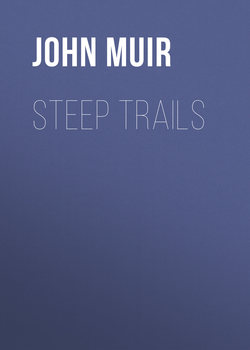Читать книгу Steep Trails - John Muir - Страница 1
ОглавлениеEDITOR'S NOTE
The papers brought together in this volume have, in a general way, been arranged in chronological sequence. They span a period of twenty-nine years of Muir's life, during which they appeared as letters and articles, for the most part in publications of limited and local circulation. The Utah and Nevada sketches, and the two San Gabriel papers, were contributed, in the form of letters, to the San Francisco Evening Bulletin toward the end of the seventies. Written in the field, they preserve the freshness of the author's first impressions of those regions. Much of the material in the chapters on Mount Shasta first took similar shape in 1874. Subsequently it was rewritten and much expanded for inclusion in Picturesque California, and the Region West of the Rocky Mountains, which Muir began to edit in 1888. In the same work appeared the description of Washington and Oregon. The charming little essay "Wild Wool" was written for the Overland Monthly in 1875. "A Geologist's Winter Walk" is an extract from a letter to a friend, who, appreciating its fine literary quality, took the responsibility of sending it to the Overland Monthly without the author's knowledge. The concluding chapter on "The Grand Canyon of the Colorado" was published in the Century Magazine in 1902, and exhibits Muir's powers of description at their maturity.
Some of these papers were revised by the author during the later years of his life, and these revisions are a part of the form in which they now appear. The chapters on Mount Shasta, Oregon, and Washington will be found to contain occasional sentences and a few paragraphs that were included, more or less verbatim, in The Mountains of California and Our National Parks. Being an important part of their present context, these paragraphs could not be omitted without impairing the unity of the author's descriptions.
The editor feels confident that this volume will meet, in every way, the high expectations of Muir's readers. The recital of his experiences during a stormy night on the summit of Mount Shasta will take rank among the most thrilling of his records of adventure. His observations on the dead towns of Nevada, and on the Indians gathering their harvest of pine nuts, recall a phase of Western life that has left few traces in American literature. Many, too, will read with pensive interest the author's glowing description of what was one time called the New Northwest. Almost inconceivably great have been the changes wrought in that region during the past generation. Henceforth the landscapes that Muir saw there will live in good part only in his writings, for fire, axe, plough, and gunpowder have made away with the supposedly boundless forest wildernesses and their teeming life.
William Frederic Bade
Berkeley, California
May, 1918
